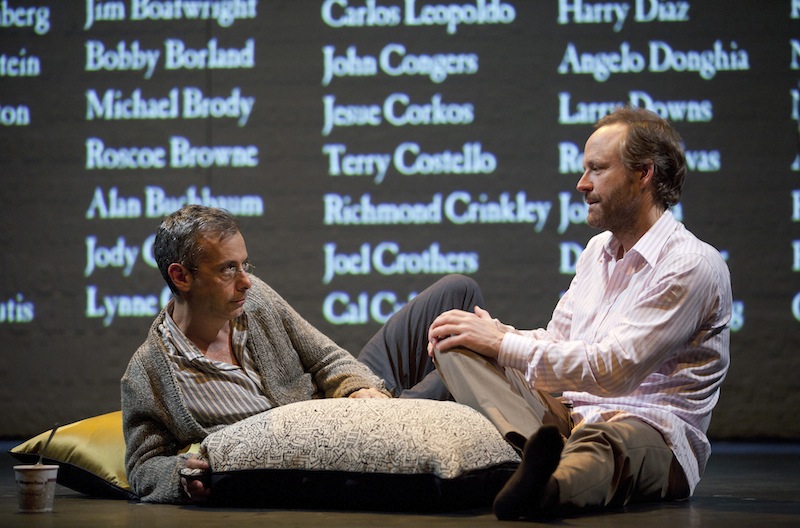The Normal Heart by Larry Kramer, The Golden Theatre, Broadway, 4/27/11-7/10/11. http://www.thenormalheartbroadway.com/. Winner of Tony Award for Best Revival, Best Featured Actress, and Best Featured Actor.
Reviewed by Becca Kidwell
WH Auden’s poem “September 1, 1939” (from which the title of the play is derived) states that “no one exists alone”. That statement reaches to the heart of the AIDS movement as we acknowledge the thirtieth anniversary of the first diagnosed case and continue to strive for full equality for every human being. Larry Kramer’s revolutionary play not only remains wholly relevant since its original production in 1985, but also challenges us to see that we have not gone far enough and there is still much work to be done. The cast shows that the only way we’re going to get through all the struggles is together.
Joe Mantello plays the caustic Ned Weeks (based on Larry Kramer’s own life). He tries to get people to change their actions in the face of the AIDS crisis. The character’s approach is in-your-face and unapologetic. Are we a part of the solution or the problem? Ned’s rough exterior is matched with a deep, passionate love for his partner, Felix (played by John Benjamin Hickey). Mantello shows that Ned is not simply a militant activist and that he will fight for love above all. Mantello’s performance is so powerful that it is surprising he didn’t win the Tony (but I did not see Jerusalem so I cannot comment on Mark Rylance’s performance). Ned is the center of this perfect storm of emotion and the production would not be the same without Mantello.
As Felix, John Benjamin Hickey, provides the support and tenderness to Ned. In fact, it seems questionable whether Ned will continue to fight if Felix dies, but Felix reminds Ned to never stop fighting. Hickey’s performance with Mantello captures an honest loving relationship that is not often seen in any love story.
Ellen Barkin matches Mantello’s forceful performance as Dr. Emma Bruckner. Emma is frustrated and angry and wants her patients to stop dying from the mysterious disease that no one seems to want to acknowledge. She enlists Ned’s help to spread the word within the gay community. Barkin’s Bruckner is probably one of the few wheelchair-bound individuals that you would not want to meet in a dark alley. Ellen Barkin shows the strength and determination needed to get the action started and demonstrates the force that still needs to be exerted today for change to occur.
Jim Parsons plays Tommy Boatwright, the Southern Belle that joins Ned’s organization because of the articles Ned wrote. Parsons is charming and yet grounded and delivers one of the most poignant and biting lines in the play: (a paraphrase) if only they had allowed us to marry this wouldn’t have been a problem; how revolutionary were Kramer’s words then and how apt they are now. Tommy sees the whole picture and becomes one of the most balanced men of Ned’s organization.
Although seemingly ineffective many times, Bruce (Lee Pace) provides the means for the organization to get mainstream recognition through his good looks and ingratiating personality. Next to Ned, Bruce seems like a coward, but Pace helps us to understand that Bruce is doing what he can in the way that he can; he gets people to open up a dialogue, which Ned’s screaming was unable to do.
A large part of the play’s power comes from the masterful direction of Joel Grey and George C. Wolfe. It is rumored that they instructed the actors to fully embody their characters and it is evident that the actors fully embrace this direction; without the sincere performances this play could have become a passive period piece, but instead, it instills more passion and a call for action TODAY that cannot be ignored. The other brilliant direction move was having the cast show support through their presence. At first it seems odd to see actors in the background of scenes where their characters play no part, but it becomes apparent that the directors have taken Auden’s words to heart an decided to show how each person affects every other person and how we cannot function without love and support. Dr. Bruckner’s speech in Act II would not be as powerful if it was simply one person speaking; the rest of the company instills an energy into Barkin that speaks to the generations and will not be silent.
What makes the production so strong is the connection between the actors and the acknowledgment of each character’s individuality. While Emma and Ned are loud, that does not discount Bruce, Tommy, or Felix’s contributions. Without the support of Luke MacFarlane, Patrick Breen, Wayne Alan Wilcox, Mark Harelik, and Richard Topol the other performances would not be as strong and the the story would not be as complete. This production of The Normal Heart models what a suppotive community should be and challenges us to not rest until “we…love one another [equally] or die.” (sic). TNETG. 6/5/11.


Well I did see Jerusalem and I say Joe Mantello should have won the Tony. The Normal Heart affected me so deeply. And Mantello won my heart. He embodied the anger, the frustration, the flashes of humor so well. What a perfectly modulated performance. I was afraid going in that this might be more like agitprop but instead, I found a terrifically human story. What an unforgettable theatre experience. What got to me the most, beyond the deaths and the government indifference, was the fear – the fear that men like Bruce Niles had about being publicly identified as gay. It broke my heart. And Lee Pace’s monologue about bringing his dying lover home reduced me to tears. I’m so glad I had a chance to see this.